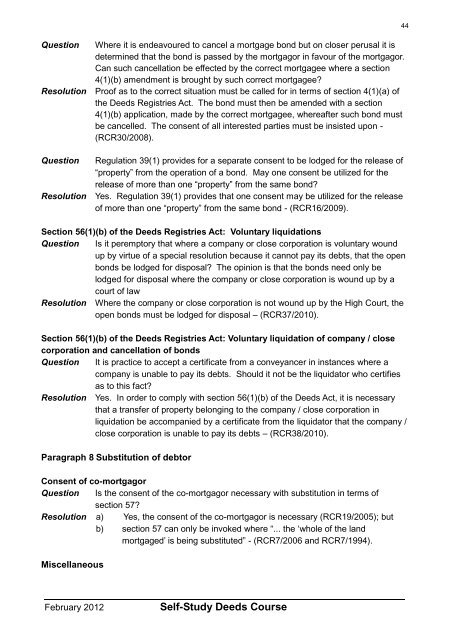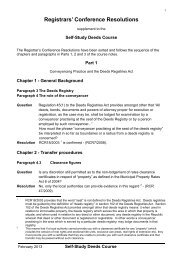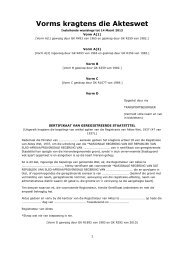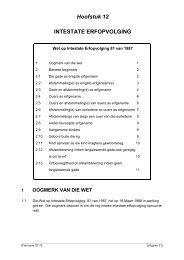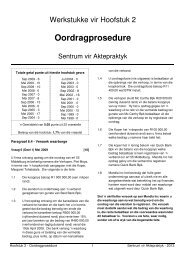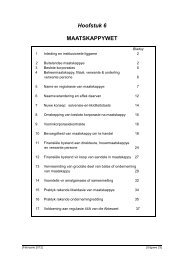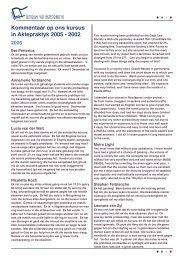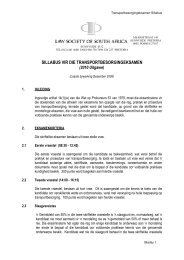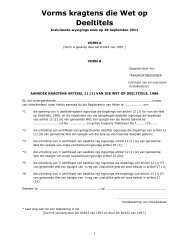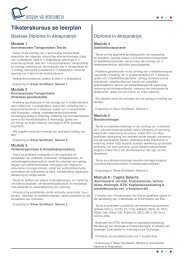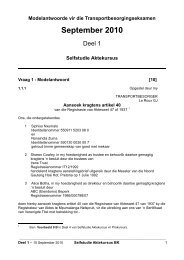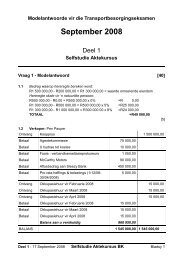Conference Resolutions - Centre for Conveyancing Practice
Conference Resolutions - Centre for Conveyancing Practice
Conference Resolutions - Centre for Conveyancing Practice
Create successful ePaper yourself
Turn your PDF publications into a flip-book with our unique Google optimized e-Paper software.
Question Where it is endeavoured to cancel a mortgage bond but on closer perusal it is<br />
determined that the bond is passed by the mortgagor in favour of the mortgagor.<br />
Can such cancellation be effected by the correct mortgagee where a section<br />
4(1)(b) amendment is brought by such correct mortgagee?<br />
Resolution Proof as to the correct situation must be called <strong>for</strong> in terms of section 4(1)(a) of<br />
the Deeds Registries Act. The bond must then be amended with a section<br />
4(1)(b) application, made by the correct mortgagee, whereafter such bond must<br />
be cancelled. The consent of all interested parties must be insisted upon -<br />
(RCR30/2008).<br />
Question Regulation 39(1) provides <strong>for</strong> a separate consent to be lodged <strong>for</strong> the release of<br />
“property” from the operation of a bond. May one consent be utilized <strong>for</strong> the<br />
release of more than one “property” from the same bond?<br />
Resolution Yes. Regulation 39(1) provides that one consent may be utilized <strong>for</strong> the release<br />
of more than one “property” from the same bond - (RCR16/2009).<br />
Section 56(1)(b) of the Deeds Registries Act: Voluntary liquidations<br />
Question Is it peremptory that where a company or close corporation is voluntary wound<br />
up by virtue of a special resolution because it cannot pay its debts, that the open<br />
bonds be lodged <strong>for</strong> disposal? The opinion is that the bonds need only be<br />
lodged <strong>for</strong> disposal where the company or close corporation is wound up by a<br />
court of law<br />
Resolution Where the company or close corporation is not wound up by the High Court, the<br />
open bonds must be lodged <strong>for</strong> disposal – (RCR37/2010).<br />
Section 56(1)(b) of the Deeds Registries Act: Voluntary liquidation of company / close<br />
corporation and cancellation of bonds<br />
Question It is practice to accept a certificate from a conveyancer in instances where a<br />
company is unable to pay its debts. Should it not be the liquidator who certifies<br />
as to this fact?<br />
Resolution Yes. In order to comply with section 56(1)(b) of the Deeds Act, it is necessary<br />
that a transfer of property belonging to the company / close corporation in<br />
liquidation be accompanied by a certificate from the liquidator that the company /<br />
close corporation is unable to pay its debts – (RCR38/2010).<br />
Paragraph 8 Substitution of debtor<br />
Consent of co-mortgagor<br />
Question Is the consent of the co-mortgagor necessary with substitution in terms of<br />
section 57?<br />
Resolution a) Yes, the consent of the co-mortgagor is necessary (RCR19/2005); but<br />
b) section 57 can only be invoked where “... the ‘whole of the land<br />
mortgaged’ is being substituted” - (RCR7/2006 and RCR7/1994).<br />
Miscellaneous<br />
February 2012 Self-Study Deeds Course<br />
44


